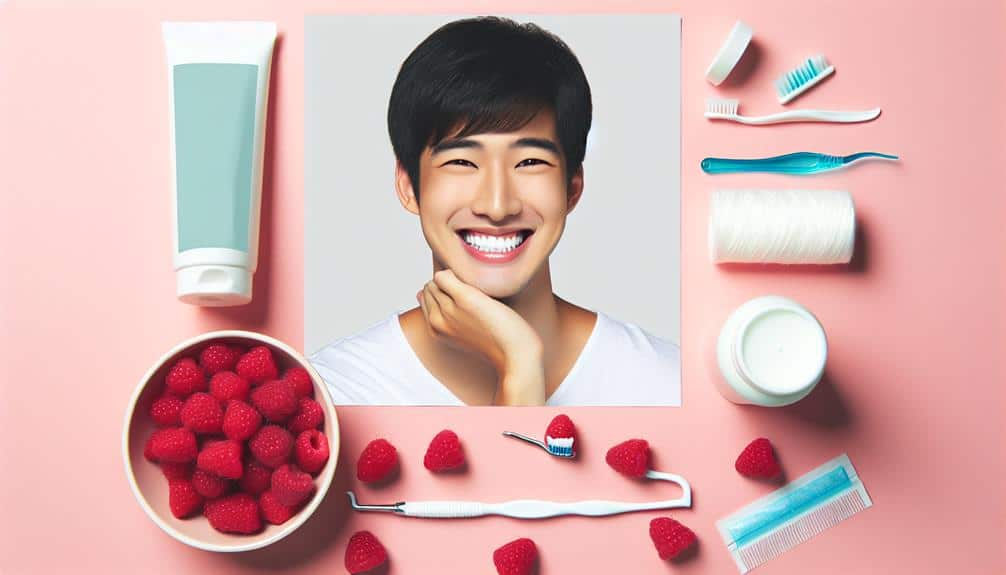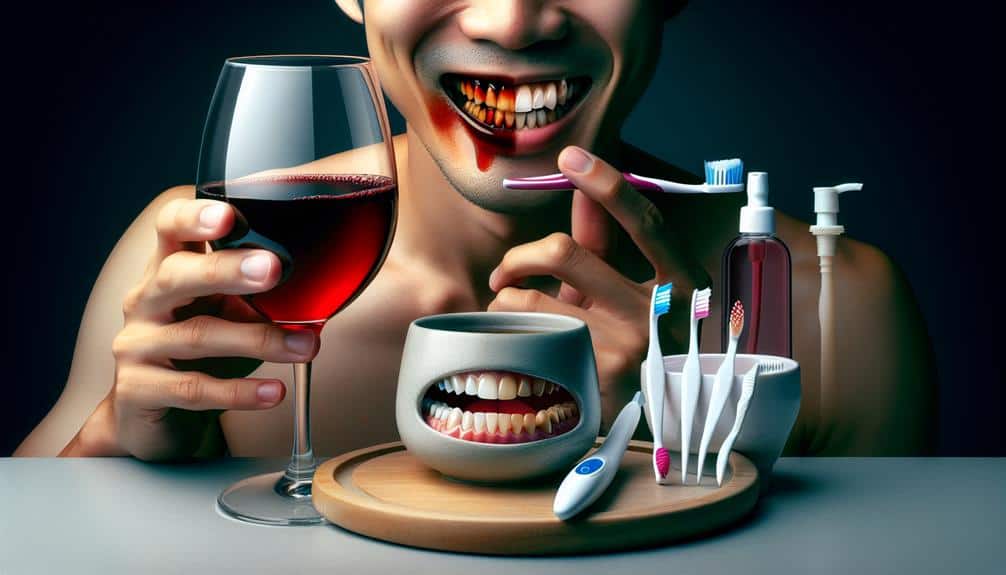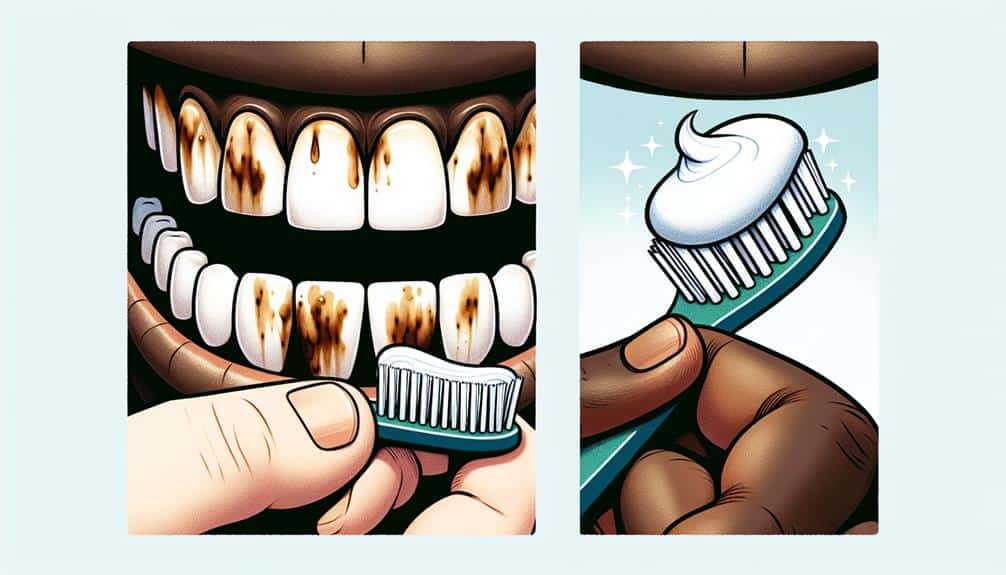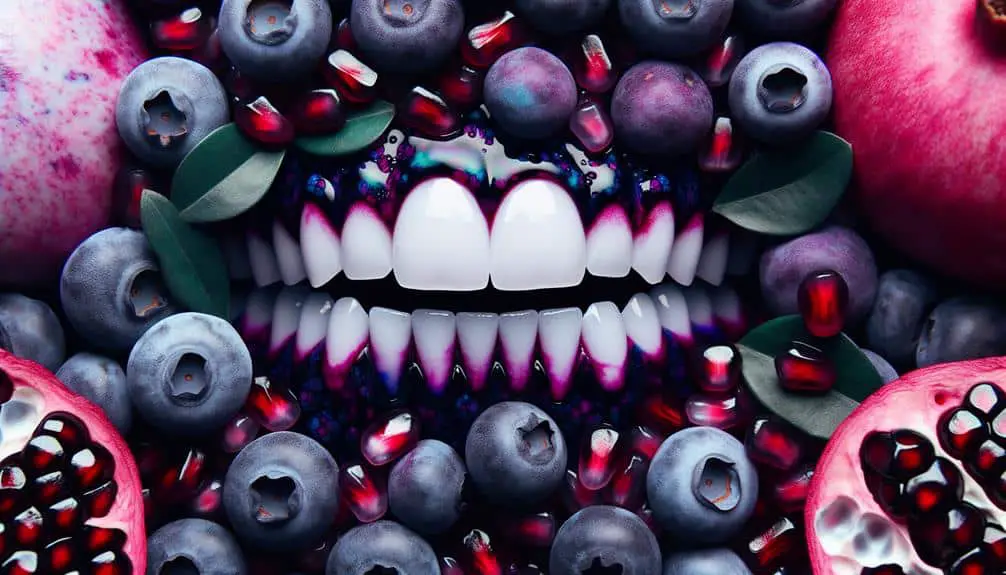To combat raspberries' teeth staining, focus on brushing and flossing properly, use whitening toothpaste with ingredients like hydrogen peroxide, visit your dentist regularly for cleanings, include mouthwash in your routine, and consider using straws. A balanced diet rich in fruits and vegetables can help with staining, opt for whole fruits instead of juices, and choose teeth-friendly snacks. Professional whitening treatments and natural remedies like oil pulling with coconut oil or herbal toothpaste can also be beneficial. Remember, a holistic approach to oral care can effectively prevent and remove stains caused by raspberries.
Key Points
- Rinse mouth with water after consuming raspberries to reduce staining.
- Brush teeth gently after eating raspberries to prevent discoloration.
- Use a straw when consuming raspberry-containing beverages to minimize contact with teeth.
- Consume raspberries in moderation and alongside other foods to lessen staining effects.
- Visit your dentist regularly for professional cleanings and advice on maintaining white teeth.
Brushing Techniques
To effectively combat teeth staining caused by raspberries, employing proper brushing techniques is essential. When it comes to preventing stains from deeply pigmented foods like raspberries, incorporating flossing techniques into your oral hygiene routine is vital. Flossing helps remove food particles and plaque from between teeth, which can contribute to staining if not addressed. By making flossing a daily habit, you can minimize the chances of raspberry pigments lingering in hard-to-reach areas.
In addition to flossing techniques, paying attention to your dietary habits is equally significant. Consuming a balanced diet rich in fruits and vegetables while limiting highly pigmented foods like raspberries can help reduce the risk of staining. Making lifestyle changes such as quitting smoking and reducing your intake of sugary and acidic beverages can also contribute to maintaining a brighter smile.
Whitening Toothpaste
If you're seeking to counteract teeth staining from raspberries, whitening toothpaste could be a valuable addition to your oral care routine. These toothpastes typically include abrasive agents or chemicals that aid in eliminating surface stains from your teeth.
While whitening toothpaste can be efficient in brightening your smile, it's crucial to utilize it alongside correct brushing techniques for best outcomes.
Toothpaste Ingredients
Considering the demand for brighter smiles, whitening toothpaste typically contains abrasive compounds and chemicals to remove surface stains on teeth. When selecting a whitening toothpaste, understanding the key ingredients that contribute to its effectiveness is crucial.
Here are some common ingredients found in whitening toothpaste:
- Hydrogen Peroxide: Aids in lightening tooth color by breaking down stains.
- Baking Soda: Functions as a gentle abrasive to eliminate surface stains softly.
- Potassium Nitrate: Assists in reducing tooth sensitivity that may arise with whitening.
- Silica: Another gentle abrasive that helps in eliminating stains without harming enamel.
- Fluoride: Enhances enamel strength and aids in cavity prevention while whitening.
These components collaborate to provide you with a brighter, stain-free smile.
Brushing Techniques
When using whitening toothpaste, make sure your brushing techniques effectively target surface stains for a brighter smile. To maximize the whitening effects, apply a pea-sized amount of toothpaste on a soft-bristled brush. Brush gently in circular motions for two minutes, ensuring you cover all tooth surfaces. Remember not to scrub too vigorously to prevent enamel damage.
Incorporating proper flossing techniques into your routine can further remove plaque and prevent staining between teeth. Additionally, maintaining good dietary habits such as reducing sugary and staining foods can help preserve your whitened smile. Making lifestyle changes like quitting smoking and staying hydrated can also contribute to maintaining a radiant smile.
Dental Cleanings
Regular dental cleanings are essential for maintaining oral health and preventing teeth staining caused by consuming raspberries. During these cleanings, your dentist or dental hygienist will remove plaque and tartar buildup, which can contribute to teeth discoloration. Here are some key points to keep in mind regarding dental cleanings:
- Professional Guidance: Dental professionals can provide personalized advice on oral care practices tailored to your specific needs.
- Early Detection: Regular cleanings allow for the early detection of any oral health issues, preventing them from escalating and causing more significant problems.
- Thorough Cleaning: Professional cleanings reach areas that may be challenging to clean thoroughly at home, ensuring a more thorough removal of stains and plaque.
- Preventive Treatments: Dental cleanings often include fluoride treatments to strengthen tooth enamel and dental sealants to protect against decay.
- Optimal Oral Hygiene: Combining dental cleanings with good oral hygiene practices at home, including proper flossing techniques, enhances the effectiveness of stain prevention efforts.
Mouthwash Solutions
Looking to optimize your oral hygiene routine with an effective solution? Mouthwash can be a valuable addition to your daily habits, complementing brushing and flossing. While mouthwash isn't a substitute for brushing and flossing, it can provide additional benefits. When used after flossing, mouthwash can reach areas that your toothbrush might miss, helping to remove food particles and bacteria. Mouthwash effectiveness in reducing plaque and gingivitis has been well-documented.
Beyond just improving oral health, certain mouthwashes can offer specific benefits related to diet. For example, using a fluoride mouthwash can help strengthen enamel and protect against cavities, especially important if your diet includes sugary or acidic foods that can erode tooth enamel. Additionally, some mouthwashes contain antibacterial properties that can help combat bad breath caused by food particles or bacteria in the mouth.
Incorporating mouthwash into your daily routine can enhance your oral care efforts, providing additional protection and benefits beyond what brushing and flossing alone can achieve.
Straw Usage
To further enhance your oral hygiene regimen, contemplate the impact of using straws on your dental health. Straws can be advantageous in minimizing teeth staining caused by raspberries. Here are some key points to ponder when incorporating straws into your daily routine:
- Opt for reusable straws: Invest in reusable straws crafted from materials like stainless steel or silicone. They're eco-friendly options that reduce the environmental impact of single-use plastic straws.
- Explore different straw alternatives: Bamboo, glass, or even paper straws are great substitutes that aid in reducing waste and minimizing your carbon footprint.
- Protect your teeth: Using a straw can help direct staining liquids away from your teeth, diminishing the contact between the staining agent and your enamel.
- Maintain proper hygiene: Remember to cleanse your reusable straws thoroughly after each use to prevent bacterial growth and uphold good oral health.
- Consult your dentist: If you have specific dental concerns or conditions, consult your dentist to determine the best straw options for your oral health needs.
Healthy Snacking
When it comes to healthy snacking, making nutritious choices, practicing portion control, and maintaining a good dental care routine are key aspects to focus on.
Opt for snacks like fruits, vegetables, nuts, or yogurt that aren't only delicious but also provide essential nutrients for your overall health.
Remember to brush your teeth or rinse your mouth after snacking to prevent any potential teeth staining and maintain good oral hygiene.
Nutritious Snack Choices
Choosing nutrient-dense snacks is essential for preserving overall health and preventing teeth staining caused by raspberries. When it comes to healthy snacking, opt for fruit alternatives to satisfy your sweet cravings while supporting dental health and a balanced diet.
Here are some nutritious snack choices to contemplate:
- Fresh apple slices with almond butter
- Greek yogurt topped with mixed berries
- Carrot sticks with hummus
- Handful of mixed nuts and seeds
- Sliced cucumber with guacamole
These snack options not only provide essential nutrients but also help in maintaining good oral hygiene. Remember to practice mindful eating by savoring each bite and enjoying the flavors and textures of these wholesome snacks.
Portion Control Tips
Implementing effective portion control strategies is essential for maintaining a healthy snacking routine and supporting overall well-being.
When it comes to fruit intake, portion control is key to prevent overconsumption of sugars that can impact dental hygiene. Opt for whole fruits instead of fruit juices to increase satiety and fiber intake, promoting better portion control.
Pre-portioning snacks like berries, apple slices, or grapes into small containers can help you avoid mindlessly eating large quantities. Be mindful of serving sizes to balance your fruit consumption throughout the day.
Dental Care Routine
To maintain ideal dental health while snacking, it's important to establish a consistent dental care routine that supports overall oral hygiene. Ensuring your teeth stay healthy requires more than just brushing; incorporating the right habits is essential. Here are some tips to help you maintain a healthy smile:
- Brushing: Brush your teeth after snacking to remove food particles and prevent plaque buildup.
- Flossing techniques: Use proper flossing techniques to clean between teeth where a toothbrush can't reach.
- Healthy snacking: Choose teeth-friendly snacks like fruits and vegetables over sugary or acidic foods.
- Regular dental check-ups: Visit your dentist for routine cleanings and check-ups to catch any issues early.
- Limit sugary drinks: Opt for water over sugary beverages to reduce the risk of tooth decay.
Water Consumption
Increasing your daily water intake can play a significant role in combatting raspberries teeth staining. Hydration benefits derived from adequate water consumption include maintaining saliva production, which helps wash away food particles that can contribute to teeth staining. Additionally, staying hydrated supports overall oral health benefits by preventing dry mouth, a condition that can lead to bad breath and an increased risk of cavities. Drinking water throughout the day not only keeps your mouth moist but also dilutes the acids produced by bacteria in the mouth, reducing the likelihood of enamel erosion and staining.
To maximize the effects of water consumption in preventing raspberries teeth staining, consider carrying a water bottle with you during the day to ensure easy access to hydration. Opt for water over sugary beverages to avoid additional staining agents on your teeth. By making a conscious effort to increase your water intake, you can take a simple yet effective step towards maintaining a brighter, stain-free smile.
Professional Whitening
Considering the potential benefits of water consumption for maintaining oral health, exploring professional whitening treatments can further enhance the brightness of your smile. Professional whitening procedures are performed by dental experts and can provide more significant results compared to at-home remedies. Here are some key points to keep in mind:
- Effectiveness: Professional whitening treatments are highly effective in removing deep stains that DIY treatments may not address adequately.
- Customization: Dentists can tailor the whitening process to your specific needs, ensuring a personalized approach for best results.
- Safety: Undergoing professional whitening guarantees that the procedure is carried out safely, minimizing risks and potential damage to your teeth and gums.
- Longevity: The results of professional whitening tend to last longer than those of at-home products, maintaining your bright smile for an extended period.
- Professional Guidance: Dental professionals can offer valuable advice on foods to avoid and diet tips to help maintain your newly whitened teeth.
When contemplating professional whitening, consult with your dentist to determine the most suitable treatment for your teeth staining concerns.
Natural Remedies
When exploring ways to combat raspberry teeth staining, natural remedies offer a gentle and holistic approach to enhancing your smile's brightness. Herbal remedies can be effective in preventing stains caused by raspberries. For instance, using a mixture of baking soda and hydrogen peroxide as a DIY solution can help remove surface stains and brighten your teeth.
Additionally, oil pulling with coconut oil is a popular natural method that may contribute to oral health by reducing bacteria in the mouth and potentially preventing staining.
To maintain your oral health and prevent raspberry stains, consider incorporating natural remedies like herbal toothpaste containing ingredients such as neem or licorice root, known for their stain-fighting properties. Consuming crunchy fruits and vegetables like apples and carrots can also help naturally cleanse your teeth and prevent staining.
Regular Dental Checkups
Regular dental checkups are essential in maintaining good oral health. Dentists recommend visiting every six months for a thorough examination and professional cleaning.
Importance of Checkups
To maintain ideal oral health and prevent potential issues, scheduling routine dental checkups is essential. Regular checkups play a significant role in ensuring your teeth and gums stay healthy. Here are some reasons why these appointments are important:
- Early Detection: Dental checkups help catch any issues early on, preventing them from escalating.
- Professional Cleaning: Regular cleanings help remove plaque and tartar buildup, preventing decay.
- Personalized Advice: Dentists provide tailored advice on oral hygiene practices for your specific needs.
- Preventive Care: These checkups allow for preventive measures to be taken to avoid future problems.
- Overall Health: Good oral health contributes to your overall well-being, making regular checkups crucial.
Make sure not to skip these appointments for the best oral health.
Frequency of Appointments
Scheduling routine dental checkups plays a significant role in maintaining excellent oral health and preventing potential issues. Regular appointments allow your dentist to monitor any changes in your oral health, catch problems early, and provide appropriate interventions.
To guarantee you stay on top of your dental hygiene, it's vital to schedule appointments at least every six months. Many dental offices offer follow-up reminders to help you stay organized with your appointments.
During these checkups, your dentist can also provide guidance on proper flossing techniques tailored to your specific needs. By committing to regular dental visits and following your dentist's recommendations, you can maintain a healthy smile and prevent staining from raspberries and other culprits.
Prevention Is Key
Maintaining excellent oral health and preventing potential issues hinges on the key practice of scheduling routine dental checkups. Regular visits to your dentist can help catch any problems early and prevent serious issues down the line. Here are some important points to keep in mind:
- Flossing tips: Proper flossing can help remove food particles and plaque between teeth.
- Dietary choices: Limiting sugary and acidic foods can help prevent tooth decay and staining.
- Oral hygiene: Brushing twice a day and using mouthwash can help maintain a healthy mouth.
- Healthy habits: Avoid smoking and excessive alcohol consumption, as they can impact oral health.
- Professional guidance: Dentists can provide personalized advice on how to improve your oral health routine.
Frequently Asked Questions
Can Eating Raspberries in Combination With Other Foods or Drinks Help Prevent Teeth Staining?
When combining raspberries with certain foods or drinks, you can potentially reduce teeth staining. Berry pairings or drink combos like green tea may offer preventive measures. Remember, proper brushing tips can also help maintain your pearly whites.
Are There Any Specific Toothbrush Bristle Types or Materials That Are More Effective at Removing Raspberry Stains?
For removing raspberry stains, consider toothbrush bristle types and materials. Soft bristles are effective at gently cleaning teeth without causing damage. Brushing techniques like circular motions and reaching all tooth surfaces can help prevent staining.
How Long Should One Wait After Eating Raspberries Before Brushing Their Teeth to Prevent Further Staining?
Wait at least 30 minutes after eating raspberries before brushing your teeth. This helps prevent further staining as acidic foods weaken enamel temporarily. Prioritize dental health by timing your brushing and being mindful of stain-causing dietary habits.
Are There Any Specific Techniques for Removing Raspberry Stains From Dental Appliances Like Braces or Retainers?
When cleaning dental appliances like braces or retainers, use gentle brushing techniques with a soft-bristled toothbrush and a non-abrasive cleaning solution. To prevent raspberry stains, consider soaking appliances in a mixture of water and baking soda.
Can Certain Medications or Health Conditions Increase the Likelihood of Teeth Staining From Raspberries?
When it comes to dental hygiene and stain removal, be aware of medication interactions and health conditions that can heighten teeth staining from raspberries. Understanding these factors can help you maintain a brighter smile.



